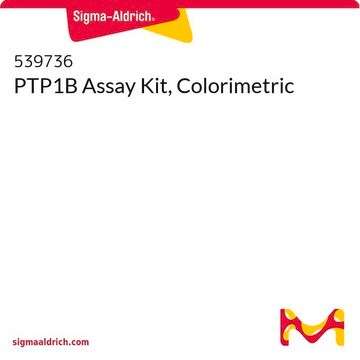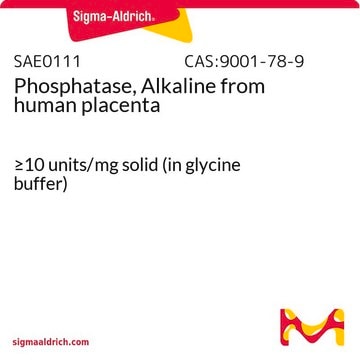17-125
PTP Assay Kit 1
PTP Assay Kit 1 can be used to detect PTP-1B activity by dephosphorylation of the phosphopeptide (RRLIEDAEpYAARG) using malachite green detection, or by hydrolysis of pNPP.
Sign Into View Organizational & Contract Pricing
All Photos(1)
About This Item
UNSPSC Code:
12161503
eCl@ss:
32161000
NACRES:
NA.84
Recommended Products
Quality Level
manufacturer/tradename
Upstate®
technique(s)
activity assay: suitable (phosphatase)
NCBI accession no.
UniProt accession no.
detection method
colorimetric
shipped in
wet ice
Gene Information
human ... PTPN1(5770)
Application
PTP Assay Kit 1 can be used to detect PTP-1B activity by dephosphorylation of the phosphopeptide (RRLIEDAEpYAARG) using malachite green detection, or by hydrolysis of pNPP.
Used to detect/quantify: PTP
Packaging
Kit capacity: 100 assays
Components
Tyrosine Phosphopeptide (RRLIEDAEpYAARG] (Cat.# 12-217)
Malachite Green Solution A (Cat.# 20-105)
Malachite Green Additive (Cat.# 20-104)
Phosphate Standard (Cat.# 20-103)
pNPP (p-Nitrophenyl Phosphate) (Cat.# 20-106)
pNPP Tyr Assay Buffer (Cat.# 20-180)
96-well microtiter plate
Malachite Green Solution A (Cat.# 20-105)
Malachite Green Additive (Cat.# 20-104)
Phosphate Standard (Cat.# 20-103)
pNPP (p-Nitrophenyl Phosphate) (Cat.# 20-106)
pNPP Tyr Assay Buffer (Cat.# 20-180)
96-well microtiter plate
Quality
routinely evaluated by malachite green and pNPP hydrolysis assays to detect PTP-1B (Catalog # 14-109 or Catalog # 14-358) activity by dephosphorylation of the phosphopeptide
Legal Information
UPSTATE is a registered trademark of Merck KGaA, Darmstadt, Germany
Disclaimer
Unless otherwise stated in our catalog or other company documentation accompanying the product(s), our products are intended for research use only and are not to be used for any other purpose, which includes but is not limited to, unauthorized commercial uses, in vitro diagnostic uses, ex vivo or in vivo therapeutic uses or any type of consumption or application to humans or animals.
Signal Word
Warning
Hazard Statements
Precautionary Statements
Hazard Classifications
Aquatic Chronic 3 - Met. Corr. 1
Storage Class Code
8A - Combustible corrosive hazardous materials
Certificates of Analysis (COA)
Search for Certificates of Analysis (COA) by entering the products Lot/Batch Number. Lot and Batch Numbers can be found on a product’s label following the words ‘Lot’ or ‘Batch’.
Already Own This Product?
Find documentation for the products that you have recently purchased in the Document Library.
Wenbin Xiao et al.
Blood, 116(26), 6003-6013 (2010-09-23)
Hyperactivation of the transcription factor Stat5 leads to various leukemias. Stat5 activity is regulated by the protein phosphatase SHP-1 in a phospholipase C (PLC)-β3-dependent manner. Thus, PLC-β3-deficient mice develop myeloproliferative neoplasm, like Lyn (Src family kinase)- deficient mice. Here we
Involvement of Src-homology-2-domain-containing protein-tyrosine phosphatase 2 in T cell activation.
P Tailor et al.
European journal of biochemistry, 237(3), 736-742 (1996-05-01)
Activation of resting T lymphocytes by ligands to the complex of T cell antigen receptor (TCR) and CD3 is initiated by a series of critical tyrosine phosphorylation and dephosphorylation events. Protein-tyrosine kinases of the Syk, Src and Csk families and
Tamer Ahmed et al.
American journal of physiology. Gastrointestinal and liver physiology, 291(1), G35-G44 (2006-04-01)
Growth hormone (GH) stimulates STAT5 phosphorylation by JAK2, which activates IGF-I and serine protease inhibitor 2.1 (Spi 2.1) transcription, whereas STAT5 dephosphorylation by protein tyrosine phosphatases (PTPs) terminates this signal. We hypothesized that the inhibitory effects of TNF on GH
P A Ram et al.
The Journal of biological chemistry, 272(28), 17694-17702 (1997-07-11)
Growth hormone (GH) rapidly stimulates tyrosine phosphorylation followed by serine/threonine phosphorylation of multiple cytoplasmic STAT transcription factors, including one, STAT5b, that is uniquely responsive to the temporal pattern of plasma GH stimulation in rat liver and is proposed to play
J Xu et al.
Immunity, 1(5), 423-431 (1994-08-01)
To study the potential roles of CD40L in immune responses, we generated CD40L-deficient mice by gene targeting. Similar to the effects of CD40L mutations in humans (hyper-IgM syndrome), CD40L-deficient mice have a decreased IgM response to thymus-dependent antigens, fail altogether
Our team of scientists has experience in all areas of research including Life Science, Material Science, Chemical Synthesis, Chromatography, Analytical and many others.
Contact Technical Service




